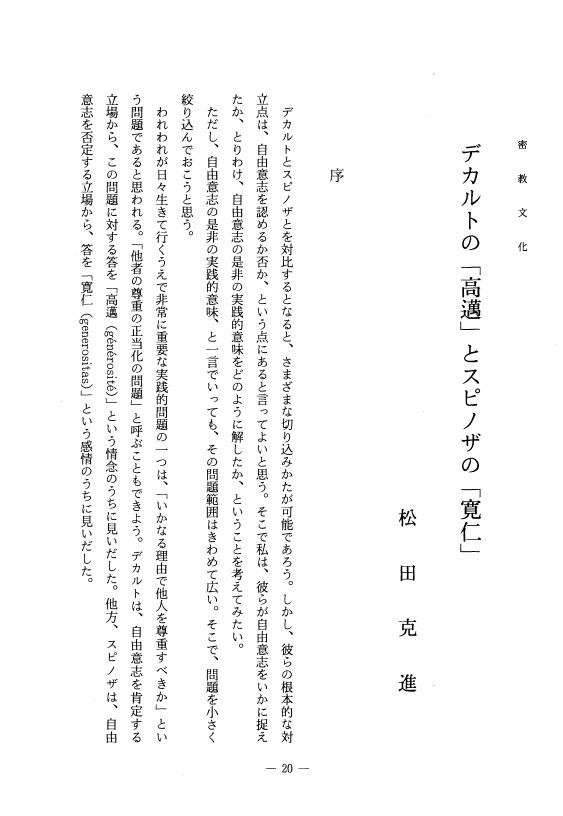29 0 0 0 OA 哲学史研究の哲学的意義
- 著者
- 松田 克進
- 出版者
- 日本哲学会
- 雑誌
- 哲学 (ISSN:03873358)
- 巻号頁・発行日
- vol.2017, no.68, pp.9-27, 2017-04-01 (Released:2017-06-14)
- 参考文献数
- 23
In this paper, the author offers an overview of some methods that have thus far been used in research on the history of philosophy. From the perspective of philosophical importance, the paper further discusses which kinds of methods are relevant or irrelevant. The examples which are specifically examined in this paper are those of Harry Wolfson, an expert in Medieval Philosophy who treated the history of philosophy exclusively from the view point of diachronic influences; Martial Gueroult, the renowned historian of twentieth century France who studied the internal structure or ‘order of reasons’ of several great philosophical systems of the past; and Jonathan Bennett who examined the history of modern philosophy in the manner of analytic philosophy. After indicating the problem with Wolfson’s method, as well as the difficulty with the idea of Dianoématique which Gueroult developed while producing his monumental works on great philosophers, the author concludes that another possible philosophically significant approach is a method which consists of analyzing the internal structure of some of the past’s philosophical doctrines (like Gueroult and others) and daring (unlike Gueroult) to criticize weaknesses, e. g. an inconsistency, in them. The author calls this method “non-idolizing or de-idolizing structuralism.”
7 0 0 0 OA スピノザ解釈史における「属性」論争
- 著者
- 松田 克進
- 出版者
- 広島修道大学
- 雑誌
- 人間環境学研究 (ISSN:13474324)
- 巻号頁・発行日
- vol.4, no.1, pp.61-80, 2005-09-30
3 0 0 0 OA デカルト的二元論は独我論に帰着するか
- 著者
- 松田 克進
- 出版者
- 日本哲学会
- 雑誌
- 哲学 (ISSN:03873358)
- 巻号頁・発行日
- vol.1995, no.46, pp.60-69,3, 1995-10-01 (Released:2009-07-23)
Many contemporary philosophers disagree to Cartesian Dualism (CD) saying that it results in solipsism, but the author shows that this is not the case. Their argument against CD is based on the belief that we could not know another person has a mind if we accepted CD, and one of the essential reasons for this belief is the view that the connection between mental workings and corporeal behaviors is at best contingent. However, Descartes himself denies this view when he proposes the 'argument from language', which says that the impossibility of mechanical explanation of speech behavior enables us to attribute minds to others.
2 0 0 0 OA デカルトの「高邁」とスピノザの「寛仁」
- 著者
- 松田 克進
- 出版者
- 密教研究会
- 雑誌
- 密教文化 (ISSN:02869837)
- 巻号頁・発行日
- vol.1995, no.190, pp.20-33, 1995-02-25 (Released:2010-03-12)
2 0 0 0 OA 『哲学の原理』第1部に於けるデカルトの実体論
- 著者
- 松田 克進 マツダ カツノリ Katunori Matuda
- 雑誌
- 人間環境学研究
- 巻号頁・発行日
- vol.3, no.1, pp.17-33, 2004-09-30
1 0 0 0 デカルト的二元論は独我論に帰着するか
- 著者
- 松田 克進
- 出版者
- 日本哲学会
- 雑誌
- 哲学 (ISSN:03873358)
- 巻号頁・発行日
- vol.1995, no.46, pp.60-69,3, 1995
Many contemporary philosophers disagree to Cartesian Dualism (CD) saying that it results in solipsism, but the author shows that this is not the case. Their argument against CD is based on the belief that we could not know another person has a mind if we accepted CD, and one of the essential reasons for this belief is the view that the connection between mental workings and corporeal behaviors is at best contingent. However, Descartes himself denies this view when he proposes the 'argument from language', which says that the impossibility of mechanical explanation of speech behavior enables us to attribute minds to others.
1 0 0 0 IR <特別寄稿><情動の知覚説>の限界 --それは人間的に複雑な情動を扱えるか--
- 著者
- 松田 克進
- 出版者
- 京都大学哲学論叢刊行会
- 雑誌
- 哲学論叢 (ISSN:0914143X)
- 巻号頁・発行日
- no.45, pp.1-15, 2018
- 著者
- 松田 克進
- 出版者
- 日本ショーペンハウアー協会
- 雑誌
- ショーペンハウアー研究 (ISSN:09195971)
- 巻号頁・発行日
- no.20, pp.46-68, 2015-11
1 0 0 0 <論文>スピノザと精神分析
- 著者
- 松田 克進
- 出版者
- 学術雑誌目次速報データベース由来
- 雑誌
- 倫理學年報 (ISSN:04830830)
- 巻号頁・発行日
- vol.44, pp.35-52, 1995

